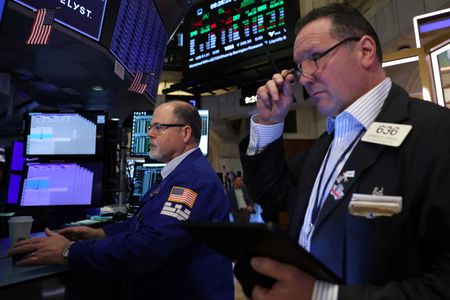By Clare Jim, Ziyi Tang, Kane Wu
HONG KONG (Reuters) -After numerous measures to resolve a liquidity crisis in the property market in recent years, Beijing is expected to end up dusting off an old playbook and step in directly to stabilise a state-backed developer seen as a bellwether for the sector.
With the crisis in the sector entering its fifth year, concerns about the financial health of China Vanke pose fresh challenges for the authorities, who have so far avoided the moral hazard of bailing out a debt-laden developer.
Vanke’s crisis came into focus last Thursday after a state media report alleged that its CEO had been detained and that it could be subject to a takeover or reorganisation. The report was deleted within hours of its publication.
Vanke, backed by state-owned shareholder Shenzhen Metro, declined to comment on the media report.
All three global rating agencies have downgraded the developer deeper into junk since the media report, citing its eroding financial flexibility and an uncertain sales outlook for 2025.
Worries over Vanke’s repayment ability intensified this month amid looming debt maturity deadlines – its next yuan repayment deadline is Jan. 27, while it has a total of $3.4 billion due this year.
The government in the southern city of Shenzhen, where Vanke is headquartered, is stepping up meetings and coordination with local state enterprises on plans to contain the company’s debt risk and on asset disposals, said two people with knowledge of the matter.
Vanke, whose interest-bearing debt stood at 331.3 billion yuan ($45.21 billion) as of the end of last June, is still trying to sell stakes in logistics platform GLP, property management unit Onewo, rental apartment businesses and shopping malls, among others, said two separate people close to the company.
The sources declined to be named as they were not authorised to speak to the media.
Vanke declined to comment. The Shenzhen government and Shenzhen Metro did not immediately respond to requests for comment.
One of the best-known household names in China with many projects across bigger cities, Vanke is around a third owned by Shenzhen Metro.
It had previously been viewed as immune to the property market turmoil which saw China Evergrande, the world’s most indebted developer with over $300 billion in liabilities, ordered into liquidation last year following its offshore debt default in late 2021.
Analysts now express concern that Vanke’s problems could be the last straw for homebuyer confidence, which has shown signs of stabilizing in the past few months, and that banks could further shut financing to the sector, squeezing developers that have not defaulted.
“Given Vanke’s iconic status in the property market in China, we think that the Shenzhen government should step in and help to solve its liquidity issue and prevent further deterioration of Vanke’s financial situation,” said Raymond Cheng, head of China research at CGS International Securities Hong Kong.
BEST-CASE SCENARIO
A full takeover of Vanke by the state, a possibility flagged by some analysts, would be a first-of-its-kind move in the world’s second-largest economy since the property sector crisis started in 2021.
In the case of China Evergrande, the Guangdong provincial government set up a risk management committee to manage the fallout after the company said it might no longer be able to meet its financial obligation.
Evergrande’s founder was later detained and the developer was subsequently ordered to be liquidated by a Hong Kong court.
“Vanke is too important to the real estate industry … if it defaults it will ruin all the previous stabilization effort by the central government, and the risk may spread to the financial system,” said a Vanke bondholder, declining to be named.
“Local government will for sure try its best to rescue Vanke.”
Some analysts say a debt default is inevitable this year without fresh liquidity support as Vanke battles plunging monthly sales to below break-even levels and difficulties in borrowing from banks and disposing off assets. It fell to fifth by sales value last year from second in 2023.
A Vanke creditor and a source close to the government in Shenzhen said a state rescue was unlikely to result in pumping in new capital, and analysts say a bailout could also involve other state firms buying assets or ensuring funding access.
A government intervention also could stem from the need to ensure the completion of pre-sold homes, as Beijing in the recent past has been ramping up efforts to bolster homebuyer confidence, JPMorgan said in a research note on Jan. 16.
A “clear government bailout” of Vanke would probably be the best-case scenario and would demonstrate that “the government is willing to put a floor under the property sector”, said Christopher Beddor, deputy China research director at Gavekal Dragonomics.
(Reporting by Clare Jim and Kane Wu in Hong Kong, Ziyi Tang in Beijing; Editing by Sumeet Chatterjee and Susan Fenton)










